#ignore the rest lol
Text


Lee Know ☆ W Korea & Gucci
#stray kids#bystay#lee know#*m.gif#*minho#linosource#analook#idk what i think about these but i think i had hoped for more ngl#also i was too lazy to try and remove the rest of the w so just ignore that lmao#will do better if they post more pics from this (i'm hoping for enough for a full compilation lol)
208 notes
·
View notes
Text
Eddie loved to read. He enjoyed immersing himself in books, letting the stories wash over him, and escaping his own reality for the imaginations of another. He adopted new personas and became someone else as he skimmed every word. He put himself in the shoes of people he could only dream of and let their lives replace the problems in his.
On the other hand, Steve hated reading. He sat alone for hours staring at words without meaning with letters that floated through paper and dripped from the pages. He couldn’t derive any knowledge from books nor could he enjoy the lives of the characters or the storylines of novels. As soon as the wretched piece of paper flipped, whatever contents were on it were swiped from his memory. He never understood the literary importance of any book much less hidden meanings somehow woven into the pages that the English teachers talked about.
After escaping the talons of both Vecna and the mob out for blood, the boys were left with too much time and too little to do. No one wanted to hire someone that associated with the town’s not-so-secret-teen-killer and on the off chance that they went into public, they were persecuted by their peers.
To deal with the boredom, loneliness, and restlessness alike, Eddie turned to reading. He would dive right into the words like Steve had dived into Lover’s Lake. He would adopt the lives of the characters and pretend that maybe his life wasn’t so bad after all.
Steve watched Eddie flip each page, a look of innocent wonder on his face and a hopeful smile on his lips. They couldn’t do book club or share notes on what was being read but Steve could still follow the emotion of the story through Eddie’s expressions and the trace of a finger along his jumping pulse. Eventually, Eddie would read aloud. He’d keep Steve entranced in the story with his raspy voice combing through every word. Sometimes he’s stumble, his eyes moving faster than his mouth could speak, but it was still the most satisfying thing Steve had ever heard.
On a random Thursday when they finally finish the book, Steve holds Eddie’s face in his hands and delicately kisses his lips for the first time.
“Maybe now it’s time we start our own story, Eds.”
And so they do.
#their favorite activity is sitting on the couch or laying in bed with Eddie reading and Steve dozing off#(I’m asexual and it shows lol)#the rest of the Party find it disgustingly mushy#however Steve and Eddie ignore them like they always do and make an even bigger effort to read in front of them#Eddie even starts reading the horrific romance books old ladies read to really piss them off#stranger things#steddie#ficlet#steve harrington#eddie munson
413 notes
·
View notes
Text
True knowledge exists in knowing you know nothing || Dr. Ratio & Socrates
Okay, I legitimately laughed out loud writing that title, but listen. LISTEN.
Ratio's inspirations derive from many sources; from referencing Archimedes's brain-blast in the tub, to being doomed to have his head bonked by Newton's apple ad infinitum in his idle animation, to his ultimate line ('esse est percipi' / 'to be is to be perceived') a direct quote from Berkeley on Idealism - it's apparent that his design nods towards scholars across time periods rather than being a direct parallel to a singular academic.
Nevertheless, just for fun, I've been rotating Ratio and ancient greek philosophers around in my head and have had a great time chewing over how parallels Socrates in particular. I am in no way saying that Hoyo even thought about Socrates while they were designing Ratio, but I thought I'd share my thoughts. I think there are some worthwhile parallels to be drawn that touch on all aspects of Ratio's own philosophy regarding ignorance, the value of knowledge, and his deep appreciation of life. So, let's get into it.
Ratio is interested in humanity and curing 'ill minds with knowledge', that 'to turn a blind eye to the folly of others is not an etiquette, but a wicked worldly practice.' Ignorance is a disease - this is a concept that can be viewed through a Socratic lens. Socrates believed that that virtue and knowledge were impossible to separate from one another, and that virtue could be developed through acquiring knowledge and insight. If knowledge is virtue, then ignorance is vice. In Socrates's mind, no one would rationally choose to do something bad. People might choose to do bad things, but this is rooted in their own perception of the world - as in, someone would only choose to do something bad (for the world, or for themselves) because they believed (erroneously) that it was the right or good thing to do. To Socrates, the cure to this was knowledge: 'There are two kinds of disease of the soul, vice and ignorance.' & 'What does most harm in the world is not sinfulness but ignorance'.
To Ratio, 'If ignorance is an ailment, it is the duty of the scholars to weed it out and heal the universe'. He views his own ignorance as 'filth' that must be cleansed through methods such as reading. He also views knowledge as a method for humans to overcome their problems - 'Another day has passed. If your problem still hasn't been solved, is it possible the problem is you?' & 'You look distressed. Is something troubling you? if so, you can figure it out for yourself.' These statements sound harsh, but they also clue us into Ratio's philosophy - that through self-examination and improvement, one can overcome one's ailments.
Socrates was also known for being a trouble-maker, he was abrupt and tactless and did not care for someone's social standing nor decorum. He was also known for using what is now called the Socratic method, asking a series of questions that ultimately seek to show contradictions in the beliefs of those who posed them, and to move systematically towards a hypothesis free from contradiction. Socrates rarely made assertions himself - after all, he had no wisdom of his own. But he could interrogate others in order to expose their own foibles, much to the embarrassment and annoyance of those around him. He was once described as a 'gnat' chewing on the 'lazy horse of Athens', causing it to wake up and spring to life due to his persistent gnawing and prodding. Ratio also employs the Socratic method - 'I'm asking questions' - and also adopts sophist tactics such as playing devil's advocate and taking opposing sides (with both himself as seen a story quest, and with others as we see with his texts urging us to take up a side so he might debate us). Through questioning and interrogation, upsetting what we consider social convention and norms, we can dispel contradictions and thereby come closer to some form of truth.
To add to this - as highlighted in the replies below - Ratio’s skill ‘intellectual midwifery’ is a reference to the Socratic method. The idea being that Socrates helped those around him give birth to the knowledge that was already within them, rather than treating his students minds as empty vessels for him to fill with his own answers. Again this is beautifully echoed in Ratio - he doesn’t want to tell you how to live your life, he wants you to work out for yourself what it is you need, thus empowering oneself through self-examination and questioning.
Socrates did not believe in writing anything down. He believed that face-to-face communication was a far more effective way of communicating knowledge - which means, unfortunately, what we know of Socrates is primarily derived from secondary sources. Much of what we know about him today comes from Plato's dialogues, and Plato was known for liberally exercising artistic license.
Although Ratio is not dead, I find it interesting that his character story is told exclusively through secondary sources. To quote - '…There are no less than eight documentaries detailing his legendary exploits, and over a dozen memoirs about him. However, despite the plethora of commentaries, none of them seems to provide a compelling perspective.' It's as though there are no surviving fragments penned by Ratio's hand and all we have to go on is through the lenses of other people. This challenges us, perhaps, to try to think about our own interpretation of Ratio since secondary sources cannot be taken as a wholly unbiased account - and once again employing the Socratic method and empowering the reader to come to their own interpretation.
While Socrates left no writing behind, he was interested in spreading knowledge. Socrates spent most of his life in Athens, a city that was, during his lifetime (~470-399 BC), a hotpot of scholars, wisemen and philosophers. Athena, the Greek god of wisdom, was named after the city - her symbol the owl that is also appropriately perched on Ratio’s shoulder. Also in Athens at this time where the sophists. The sophists were a class of intellectuals who were known to teach courses in various subjects - but often for a high fee, and generally centred around the idea that persuasion and the use of knowledge as a tool was more important than wisdom or truth itself. There's some debate about whether Socrates could be characterised as a sophist himself, but, crucially, he is characterised as refusing to take payment for his teachings. He was born a plebeian (perhaps you might describe it as a mundane background.) He was known to dress in rags and go barefoot, speaking to and (often antagonising) people from all walks of life, preferring the marketplace as a center of debate than palaces or courtrooms. I can't help but think of the sophists as similar to the genius society (or at least Ratio's depiction of them in contrast to himself), cooped up in ivory towers and gatekeeping knowledge to the most privileged. He doubts if Herta's talent is always helpful to others, he compares Screwllum to a 'monarch'. Then again, the sophists may in fact be a bit of a parallel to the Intelligentsia Guild - from Ratio, 'when someone is willing to listen to knowledge that is being disseminated and circulated, a price is created'.
Socrates (or at least the Platonic depiction of Socrates) was at one time declared the wisest man in Athens by the Oracle of Delphi. Socrates balks at this assertion - how can he possibly be the wisest man in Athens when he in fact knows nothing at all? This was not a claim made of modesty - he truly believed that he had no wisdom, that he was unsure what 'wisdom' itself even was. Ultimately, Socrates concludes that the only way that the Oracle could be correct is that by actually acknowledging that he knows nothing he paradoxically is the wisest man in Athens. All wisdom, therefore, is rooted in wondering, with wondering only possible if one is open to admitting one's own ignorance.
What I love about all of this in relation to Ratio is that Ratio styles himself as a mundanite. The Intelligensia Guild advocates that 'all knowledge must be circulated like currency' and accepts 'all beings… who seek to learn'. Ratio has no time for the satisfied self-styling of intellectualism, he himself states that 'to speak knowledge, we must first make people realise their own folly.' No one is above criticism in this regard, even himself - again, to quote 'Whenever someone agrees with me, I feel like I must be wrong.' Again, I feel as though he would resonate with Socrates here: 'Smart people learn from everything and everyone, average people from their experiences, and stupid people already have all the answers'. With Aventurine, he is quick to mock his appearance as over-the-top and vapid - once again making it clear his distate for vanity and hollow displays of showiness (albeit he may have been acting for Sunday's sake here. Also, no comment about this coming from a man who runs around in a toga, lmao)
Equally, with Aventurine, it is clear that Ratio is willing to learn from him - he apologises when he offends, he abhors his methodology and yet he still relies upon it and trusts in Aventurine's plan, he is drawn to him in some ways precisely because he is so different to himself. Aventurine (at least styles himself) as impulsive to Ratio's slow and steady methodology, Aventurine whose learning has been entirely self-made vs Ratio who has spent his life in classrooms, Ratio who scoffs at Aventurine's favourite games of chance yet adds slot machines to his simulated universe.
And to Socrates, the experience of aporia – in all of its discomfort and disruption – is the very catalyst of wonder, and that wonder was not just the root of wisdom but also the way to live a good and happy life. There is something beautiful in this to me, and this extends to Ratio. Ratio fundamentally cares about life. For all his brashness, his lashing out against 'idiots', his harsh demeanour - he wants people to live good lives, he wants to contribute to the good of humanity - all people, even those he is annoyed by, he cares so profoundly and absolutely about life. The entire reason why he is obsessed with wisdom and learning is not to exalt or elevate himself, not as some kind of ritualistic expression of piety towards a deity, but it is instead an expression of devotion towards life itself. Ratio has a strict work out routine not so that he can show off his body, but because living healthily is living well and working out is a component of that. Even the way he fusses and worries about Aventurine, someone he is pointedly irritated by, reveals how deeply his care runs. So so much of his character is centered on caring for life, even if it is not immediately obvious.
Finally, I'd like to highlight some ways in which Ratio is not like Socrates. First of all, Socrates was repeatedly described as 'ugly' by fellow philosophers Plato and Xenophon - this is contrast to Ratio being repeatedly described as 'handsome'. This is an interesting subversion to me (albeit likely an indulgent one) as in both cases both men attempt to distance their physical appearance from the weight of their words. Ratio wears the bust for many reasons, but way to view it is that he is attempting to stop his appearance from bearing any influence in the subject of debate.
Socrates was also said to be blessed by a divine touch, and as we know, this is something that agonises Ratio as Nous has not yet turned THEIR gaze towards him.
Lastly, Ratio has - thankfully - not yet been ordered by the state to drink hemlock for all his trouble-making and blustering. Though perhaps he may someday be put on trial by the IPC if the theories that he is working alongside Aventurine to undermine the corporation are true - we will just have to wait and see.
Thanks for reading my little ramble. I'd be super interested in anyone's thoughts if they'd like to share, but regardless, I'll leave off on some of my favourite wee quotes from the Rat man:
'Even a life marked by failure is a life worth living - it is only in moments of solitude and despair, when help is absent, that fools grasp how to pick themselves up.'
'Do stay alive. I wish you the best of luck.'
#dr ratio#ratio#aventurine#hsr#honkai star rail#my witterings#i love the rat man so much idk#much of the information i describe about Socrates comes from the podcast History of Philosophy without the Gaps#which I highly recommend if this is your kind of thing lol#but mostly I just wanted to have fun spinning my hyperfixation around lol#Also I make a few declarative statements throughout this but know that I do not claim to be a scholar of greek philosophy lol#please check the verasity for yourselves before relying on what I have to say#for I know nothing u see u see? :P#also I just wanna add in that I do NOT think Ratio is a perfect human being#ratio can be hypocritical and cruel and ignorant just like the rest of us#but I adore that too as afterall he is also an expression of humanity#with all its earthy faults
107 notes
·
View notes
Text

I started reading beastars so now HE's reading beastars
.wait
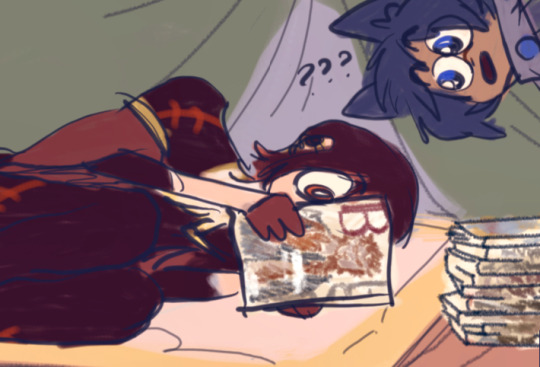
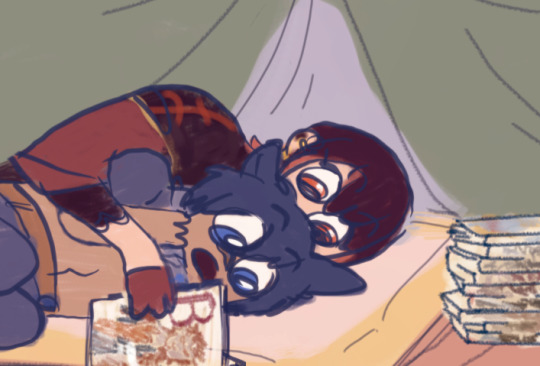
THEY'RE reading beastars
#nobody gets a prize for correctly guessing which character yakumo relates to most#when the anime first came out and everybody hopped on the hype train#i scratched my chin thoughtfully and wondered.... would i like this? it seems like i would like this. should i watch it?#and all my friends around me said 'nah you'll probably hate it. it's really sad'#so i trusted them and ignored beastars the whole time. until now. when i saw the entire series at my LOCAL LIBRARY!!!!#so of course the curiosity wins out and i start reading it and i REALLY LIKE IT?? WTF WERE MY FRIENDS ON ABOUT?#this is sad yes but most of the time it's FUNNY? and also ANIMALS R COOL? bruh. i can't trust my friends' opinions of me anymore#anyway. due to the nature of my current nuca fixation timing. i kept thinking of it while reading#drawing parallels that may only exist in my mind LOL#i can imagine yaku being a freak over legoshi and his quest to become strong but not falling to his instincts and etc.etc.#yakugaru having a manga reading session in either o their bedrooms... lying on the floor engrossed in beastly tales...#these two would absolutely have a debate about which chara is most similar to eiden#to yaku it is obvs haru but i feel like garu would see eiden in a less.... prey sort of way#or maybe they'd agree on the haru comparison!! but yaku might hesitate to voice the 'mr eiden... has to be protected...' thoughts#and garu would proudly proclaim how eiden and haru share traits like bravery/outgoingness/super cool and go-getter/wise and worldly???#i kept staring down louis like.... you're some mix of dante and edmond... and something else....#UGH i like all the characters... they all have their charms.... they are all such creatures#honestly yahya the entire time was just relatable content and after seeing the way he lived out the rest of his life *chef's kiss* GOALS#nu carnival yakumo#nu carnival garu
137 notes
·
View notes
Text

>:3
(based on this)
#ffxivsnaps#gposers#hyur#ffxiv gpose#ffxiv oc#and then the rest is history#where did paris learn this word? not from achille because he doesn't curse#my memory lied to me so this is sorta accurate lol#not me remembering that gpose stickers are a thing so ignore the adof change there#is this what i'm gonna do from now on?? make 4koma gposes???#anyway some more funny stuff#mygposes.
57 notes
·
View notes
Text
part of a 10th century Byzantine poem talking about ancient greek literature :')
The long passage of time has scattered texts,
like flowers, everywhere about the earth.
Blossoming, they did not transmit their sweet-smelling grace.
But now, crowned well by them, Konstantinos plucked some
and, composing melodious musical poetry,
set an enchanting aroma and fragrant texts
before all who partake of higher culture.
Let us wreath him with our words, that lover of words.
#ignoring the rest because that's just boring propaganda lol#but the long passage of time has scattered texts like flowers everywhere about the earth blossoming they did not transmit#their sweet smelling grace but now crowned by them
48 notes
·
View notes
Text
rare object show art from tumblr user pixieplanets
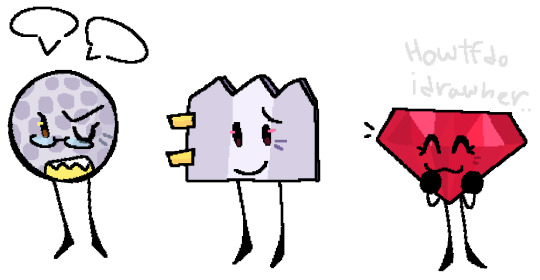
been rewatching bfdi + bfb gradually and heres some rough doodles of the little guys ive took a liking to
#ignore how small ruby is lol i made her 2 tiny and didnt feel like adjusting her size#also gb and gaty’s colors are extremely close cuz i made gb Cool colored on accident and i just took a lighter ver of her colors 4 gaty#anywyas tag time woooah#bfdi#bfb#bfdia#tpot#oh god theres so manybof these seasons urgh#bfdi gaty#bfdi golf ball#bfdi ruby#do i even tag the rest ... sure why not#bfb ruby#tpot gaty#tpot golf ball#pixie arts#battle for dream island
57 notes
·
View notes
Text
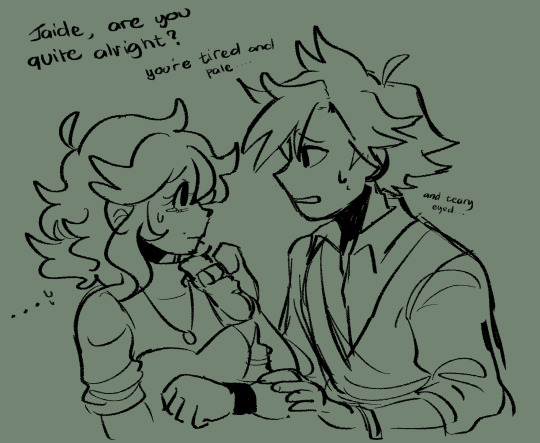


to love someone is to heal someone
#~ art#♥️ memoryshipping#ignore tags if youre just here for the art and not me going full diary mode#anyways ... this is a little personal to me#especially with how i treat her here. i think this is a direct projection of how i'm feeling right now#today has been a little harsh on me - maybe a little painful even#i'm okay now - because i resolved it. albeit harboring some bits of anger to it but its not worth fighting about anymore#its hard to say that i'm - very optimistic so to speak because it's only one pillar i just jumped over and there will be more later#and this is me coping with it and im lucky to have mustered some energy to at least express it through drawing#i havent been drawing much for myself and it makes me sad because its my source of happiness#my time for drawing is being repurposed for other stuff right now and it still is and i dont feel entirely happy doing it unfortunately#i still have many things i want to follow up on my drawing list especially in my recent interests peaking again#but i resorted for now to making something im already used to. stevaide lol fgsjsddsjjsdjkghsdjgdjkhskjghshsgsasjhjsjksdjfhsfasgs corny ass#rest assured im at a somewhat relaxed state right now. throwing boops here and there calmed me down because theres people around me#who ig thinks im cool eajdhajhd#ahh anyway
27 notes
·
View notes
Text
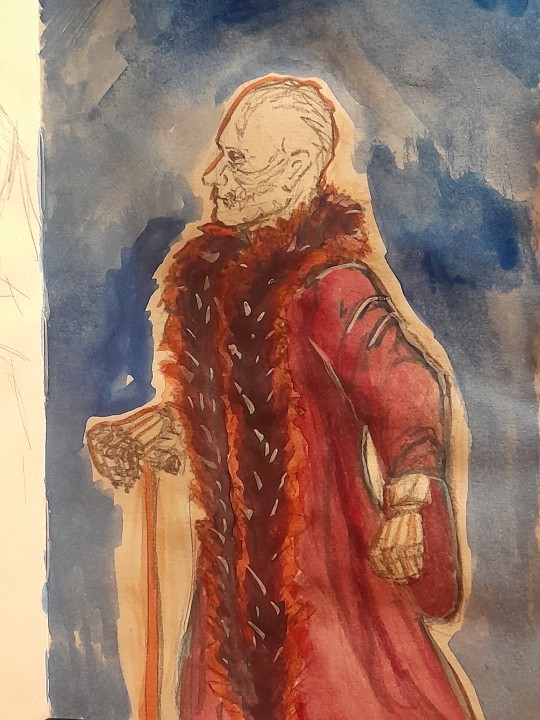
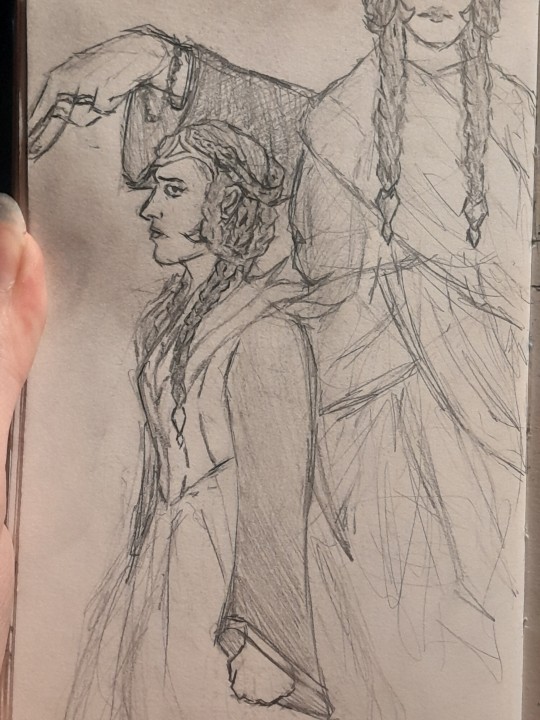

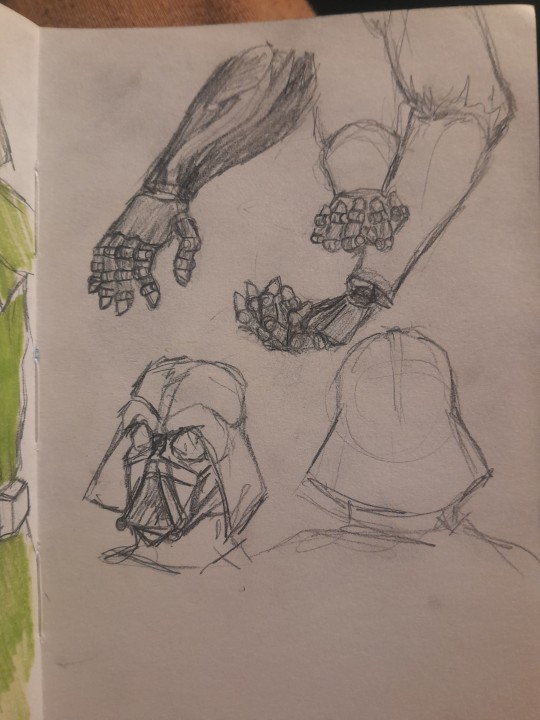


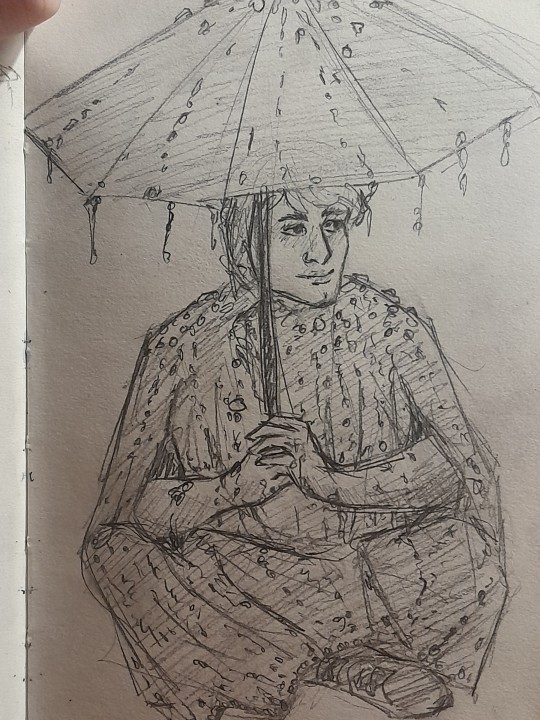

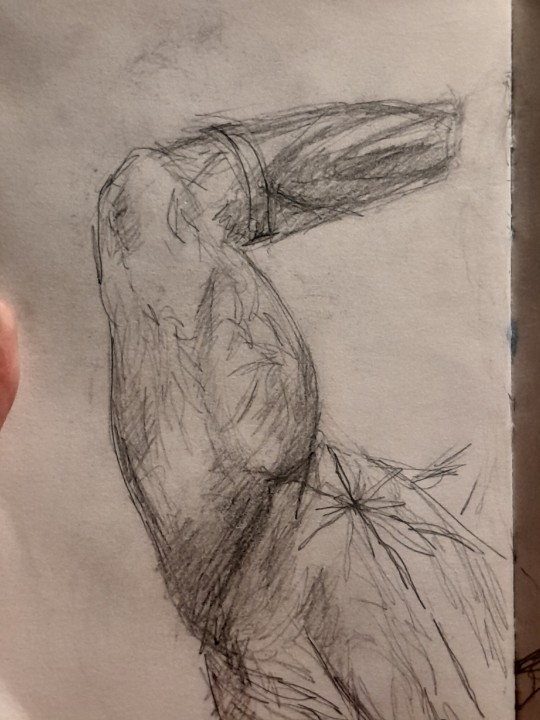
Random star wars sketch dump
#star wars#darth vader#anakin skywalker#luke skywalker#padme amidala#leia organa#star wars fanart#my art#ettie's art#fanart#random bullshit#sketch#sketchbook#idk just had a random mood to throw all my recent star wars sketches here#they are not quite as refined as the rest of my art#but ehhhh#clearly not the height of my skills but they are something#ignore my thumb there lol#and idk what like half of em are
25 notes
·
View notes
Text
Getting real tired of the "my ship is canon" crowd
#yes this unfortuneley applies to pegoryu even if i want it to be canob#like u cant just ignore the rest of the ships like 💀#u can theortically cook up evidence for any ship#but like seriously saying a ship is canon is emberassing lol#and not to say which ship this happens the most too (we all know) but its kindaaa tiring to heaa#hear arguememts upon arguememts on why their ship is Actually canon#but i digress those r their blogs not mine#the jokes r funny tho
27 notes
·
View notes
Text
I was looking up the general criticisms of Orientalism on Wikipedia just to get a sense of how this book was received critically and 90% of the criticisms are just “stop calling me and my university department racist” and “Said uses Marxism too much” which only makes me more resistant to hearing any criticisms of this book
#academia is such a joke lol. cry harder do better#like I think if you write a response called in defense of the west. you have kinda already lost#apparently there are some historical inaccuracies & over-generalisations in it#but god a lot of the criticism I’m seeing is so zero sum#like said is wrong about x therefore ignore the rest of what he says#just take it as a text! build on it don’t discard it. that’s what you’re supposed to do#anyway again each day I spend in academia is another day of deeply despising and loathing the academy#orientalism#book club
90 notes
·
View notes
Text


Did someone say Corey trading cards? 😉
This absolutely has brought me back to the days of collecting Pokemon cards and it was awesome!
I may or may not want to do a card for each round of the Globetrotter Challenge now just because I have idea's for funny abilities/moves... 🤣
Huge thank you to @squeaa and @buttertrait for the awesome template/challenge loved it so much!! 🥰
[more info under cut!]
Corey Altman - Base Card
(left side)
Everyone's favorite outlaw, now in a trading card! A common card.
ABILITY: Man's Best Friend
Get a helping paw from Sans the Dog! Retrieve one card from your opponent's deck.
Guitar Hero - 20
Corey Altman - Hero of Strangerville Edition
(right side)
A special Gold Edition card the Hero of Strangerville himself! A rare card.
ABILITY: Infection Vaccine
Cure any status conditions inflicted on this card. Can only use three times per game.
Mega Spray - 65
Based these mostly on how Pokemon cards are but it was definitely inspired by how @youredreamingofroo did their's (go check out their post it's awesome 😅).
#learned that i can open psd files in krita#i couldn't edit the text layers *but* most of it was there and intact which is awesome!!#so if you're wondering why some of it is in comic sans that's why (sorry it was the closest font I found!)#and pls ignore that fact that he's in the same outfit in both#i was going to take some *epic cool* new photos#but i got my period and can't be bothered to sit at my computer 😅#this is my favorite look of his anyway#and I *was* going to find a cool “defeating the mother” pic#but i didn't have any good ones so i'm reusing my favorite of him in the strangerville round#and yes i *will* be using that mugshot photo for the rest of time it's definitely one of my better screenshots 😆#i'm serious though about making one for each round it would be so fun!! 🤣#sorry to ramble a lot lol apparently i had more thoughts while i made these than i thought 😅#simblrtradingcards#corey altman#sans the dog#globetrotter extras
47 notes
·
View notes
Photo


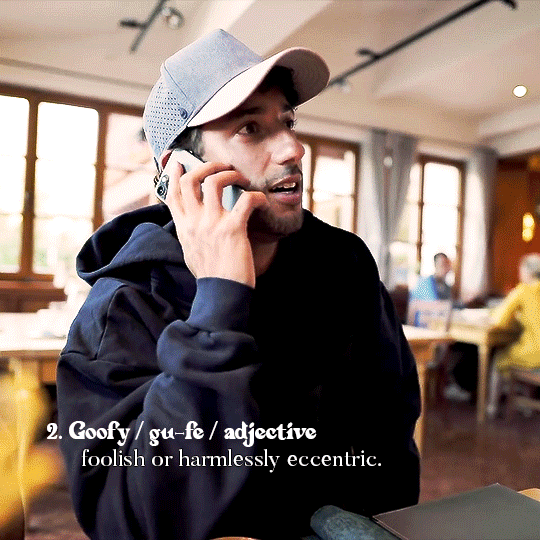


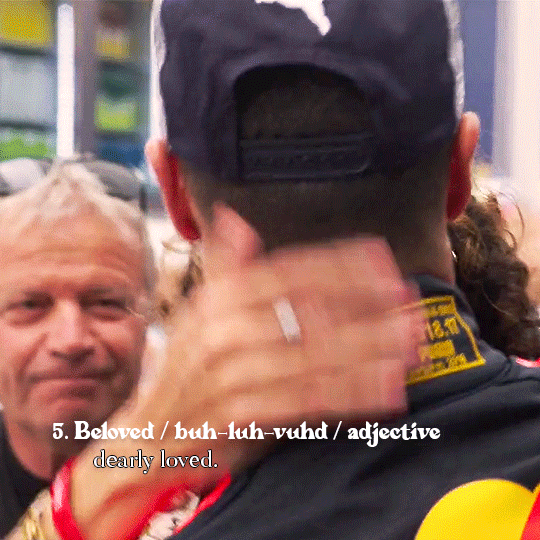
Happy 33rd birthday to the at times indescribable, always adored, sexy, goofy, magnetic, sunny, beloved ✨ Daniel Ricciardo ✨
#daniel ricciardo#oops ignore how i posted this after midnight so it's technically 2nd july in singapore lol#i had another thing planned but I couldn't finish it in time BUT I REALLLLY wanted to post something#for THE person that got me on f1blr#to commemorate!#so here's something i whipped up sorry it's SOOOO lq lmfao#thank you to jess and beth and the rest of the gc for the adjectives <3333#nadia's things#happy birthday my beloved boy cancer legend face card never declined darling darling darling danny ric
615 notes
·
View notes
Text
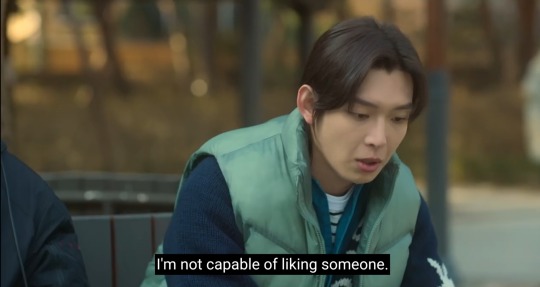
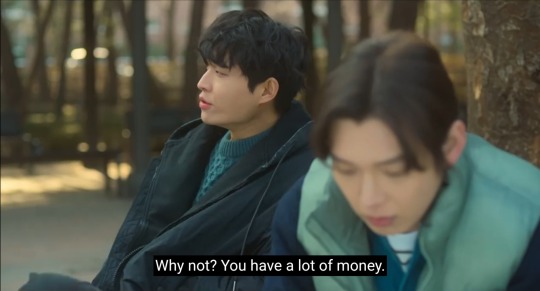
I found this to be such a random comment until I realised it was Balgeum saying it and it suddenly felt so heavy
#his money trauma runs so deep he cant see how his behaviour hurts inho much more than any money issues could#or maybe he does and its just that bad that he cant physically stop himself#when he told inho to go back i was like my man he cant keep coming back until you have enough money to feel secure#if you dont deal with this now that insecurity is gonna run for the rest of your life and even if you do have money youll always worry abou#losing them and not be able to enjoy the comfort that comes with them#and youre always going to base your feeling of self worth on them#and your happiness and everything valuable in your life would be so easy to destroy#itd crumble#i want him to see the truth so bad it hurts me watching him go through it#im happy he was at least honest with inho#thats a step#hes gonna have to take a lot of small ones too#all of these hurt boys ugh#its such a pretty show and the comedy is fun and the acting is top notch that it makes me ignore how much sadness there actually is in ever#episode#and i recommend it as a light watch because they mix the sweet and the sour so well#but i feel for all of these characters#including hyejin lol#boys be brave
15 notes
·
View notes
Text








the best girls (my opinion) (movies only)
#emilie de ravin#my things#not only mice but also gifs#reason: i've watched everything relatively short (as slowly as i could🥲) (and wanted to play with fonts x))#(“air force one is down” is technically a miniseries but it's 2 parts under 3 hours so i consider it a movie because i do what i want)#(also the fact that “love and other troubles” must exist somewhere in a decent quality and i can't find it annoys me very much🥲)#i'll probably never fully rewatch most of these (for various reasons) except for “remember me” and maybe “santa's slay” x))#i feel like i have to watch “lost” now but i don't want to be emotionally invested in anything Long#+i didn't avoid watching it when it aired only to start it 15 years later🥲#why everyone back in the day seemed to latch on one particular movie character almost entirely ignoring the rest is still a mystery to me🙃#(though i still know nothing and the party is still over)#follow me for more mediocre gifs and salty opinions on things no one has been interested in for several years now lol
12 notes
·
View notes
Text

eaouuugh
#corpse husband#amongus#I guess#help me pls#I've forgotten how to draw people that aren't fnf shaped#iiidk brainron not wanting to leave me alone#I know it's just 2 unfinished things plus a weird bean thingamajig but eh#maybe I'm worried if I don't upload I'll procastinate and won't end up producing anything cause I know I won't finish these doodles#and I started to not like the previous corpse attempt much I guess bc the teeth were so lame#so more teeth for better or worse yeehaw#idk if there'll be more corpse art or not tbh maybe I should just doodle more beans cause then I can draw his cute lil friends aswell#like a green sykkuno bean and a red rae bean and the rest aswell maybe ahh the possibilities lol#cause I probably won't draw anyone else otherwise bc learning how to draw more actual people is too much dang effort tbh ha ah well#k will stop rambling about nothing now ok cool#so enjoy more amongus ish corpse attempts or do not it's whatever#among us#I draw what I want#feel free to ignore nws ha#more bombeep and regular stuff soon hopefully fingers crossed#stream 'Never Satisfied' on spotify bc idk good music and also yelling ha#anyways laters k bye
110 notes
·
View notes